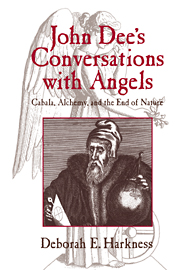Book contents
- Frontmatter
- Contents
- List of Illustrations
- Acknowledgments
- List of Abbreviations and Conventions
- Introduction
- Part I Genesis
- Part II Revelations
- 4 “Then Commeth the Ende”: Apocalypse, Natural Philosophy, and the Angel Conversations
- 5 “The True Cabala”: Reading the Book of Nature
- 6 Adam's Alchemy: The Medicine of God and the Restitution of Nature
- Epilogue
- Select Bibliography
- Index
4 - “Then Commeth the Ende”: Apocalypse, Natural Philosophy, and the Angel Conversations
Published online by Cambridge University Press: 05 May 2013
- Frontmatter
- Contents
- List of Illustrations
- Acknowledgments
- List of Abbreviations and Conventions
- Introduction
- Part I Genesis
- Part II Revelations
- 4 “Then Commeth the Ende”: Apocalypse, Natural Philosophy, and the Angel Conversations
- 5 “The True Cabala”: Reading the Book of Nature
- 6 Adam's Alchemy: The Medicine of God and the Restitution of Nature
- Epilogue
- Select Bibliography
- Index
Summary
John Dee's plan to converse with angels and gain insights into the Book of Nature emerged from his particular intellectual interests, which he pursued through decades of scholarship and inquiry. But the angel conversations also reflected the cosmology of his time, especially the late sixteenth-century conviction that the end of the world was at hand. When Dee began contacting the angels around 1569, European scholars and theologians believed they were caught up in the midst of events prophesied in the Bible's Book of Revelations that would ultimately turn the final page of the Book of Nature. Citing the decay of the earth and the heavens, the reformation of the church, and a plethora of strange natural occurrences, Dee's contemporaries lamented the final days while looking forward to the restitution of peace, plenty, and prosperity. The years for which the records of Dee's conversations survive were periods of heightened eschatological fervor: in 1572 a new star had been observed in the constellation of Cassiopeia; in 1577 Dee spent three days at Windsor Castle advising the queen about the significance of a comet; at Easter in 1580 an earthquake rocked London; and in 1583 a grand conjunction was predicted in the constellation Aries. The grand conjunction, which occurred just as Dee left for Prague, was perhaps the most significant and widely publicized sign. When it was accompanied by a particularly bright comet, the final days seemed assured.
- Type
- Chapter
- Information
- John Dee's Conversations with AngelsCabala, Alchemy, and the End of Nature, pp. 133 - 156Publisher: Cambridge University PressPrint publication year: 1999



